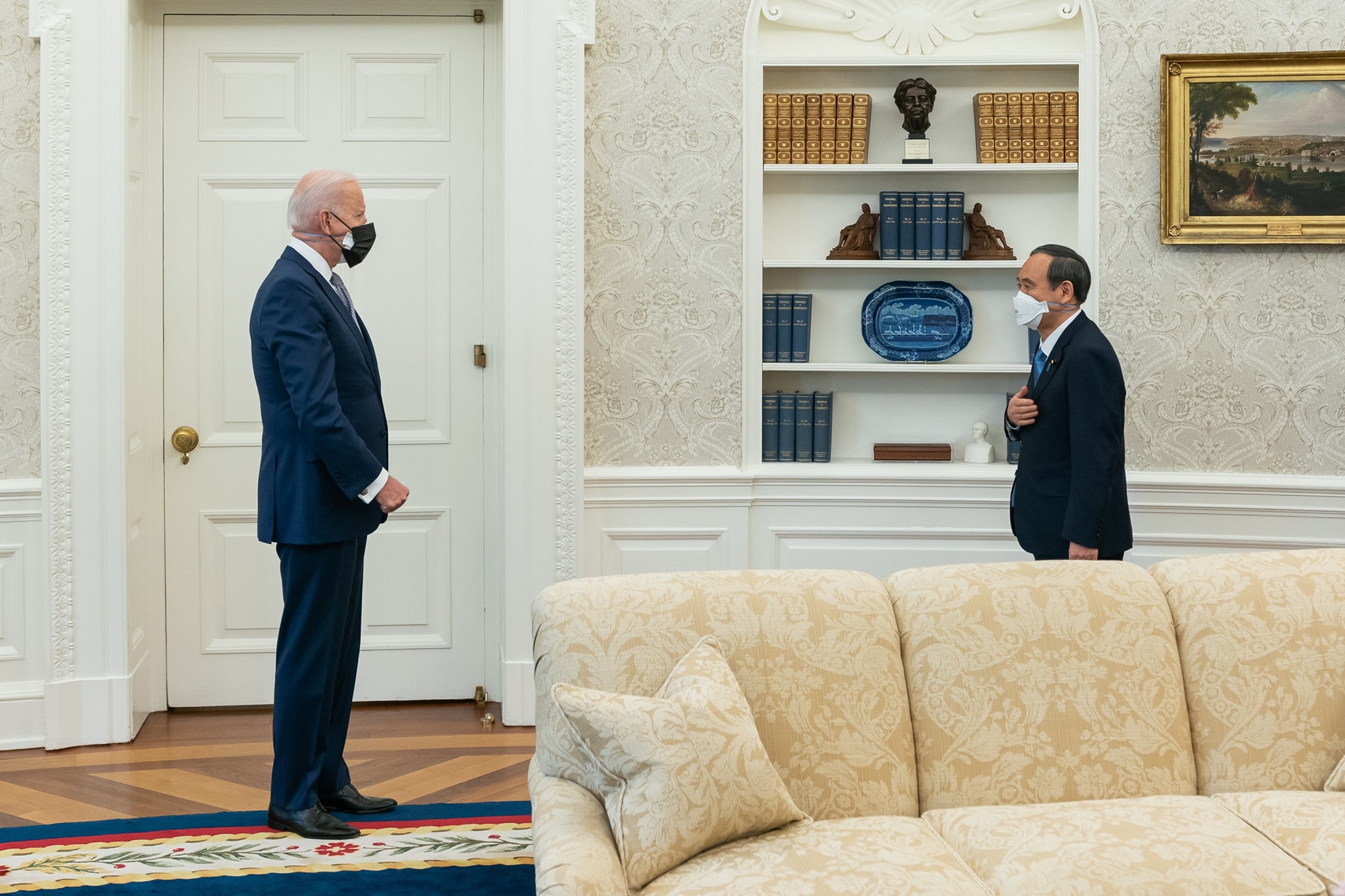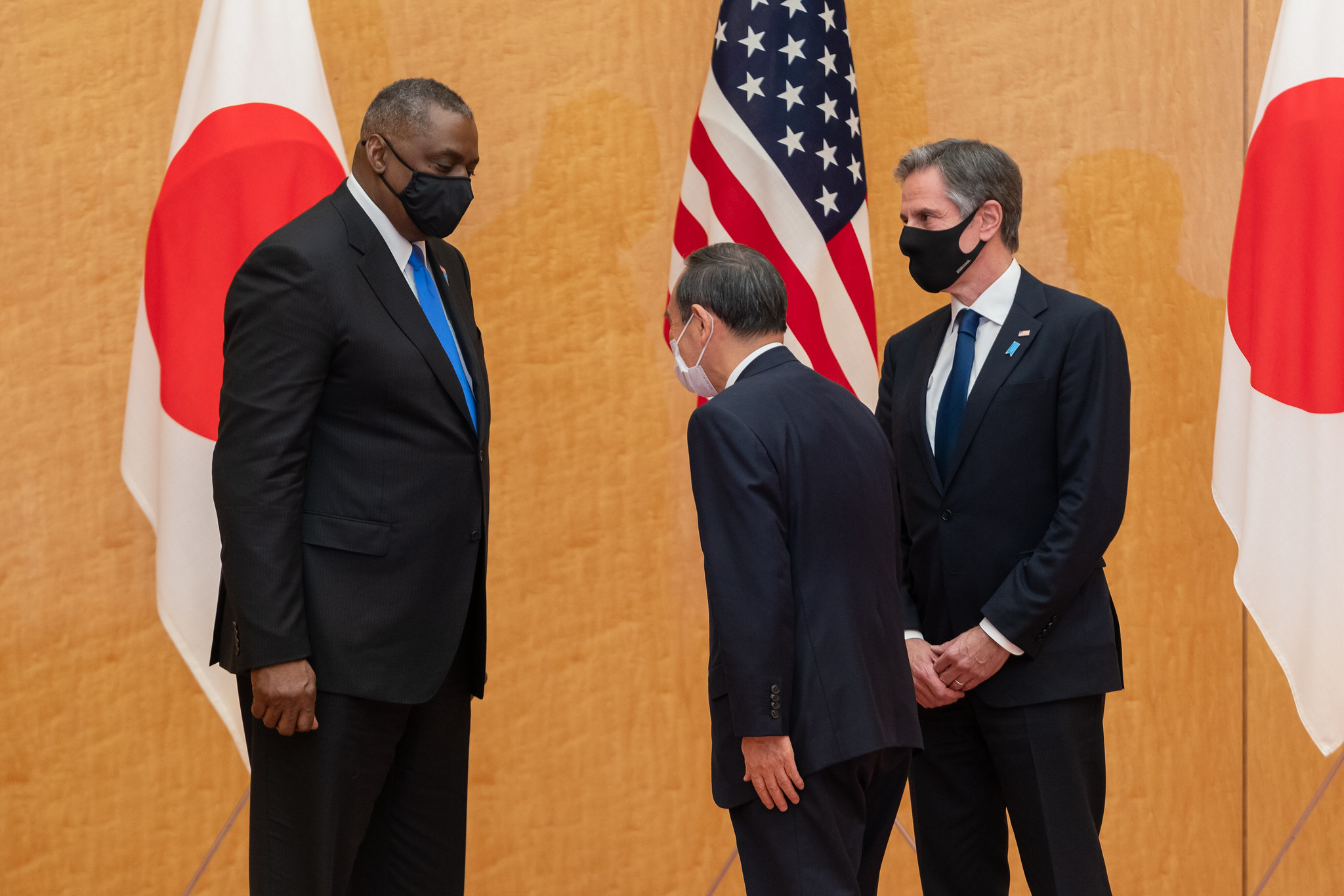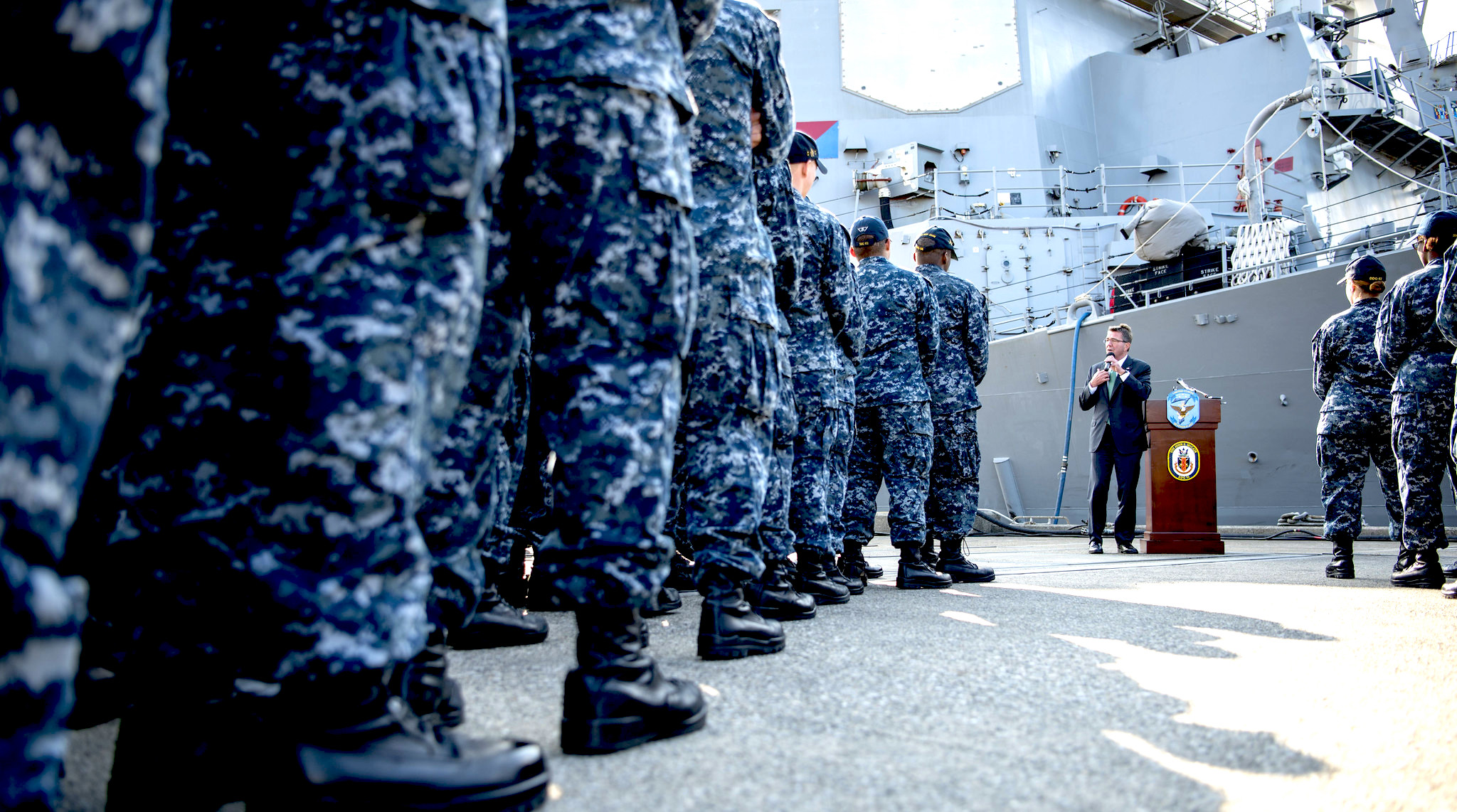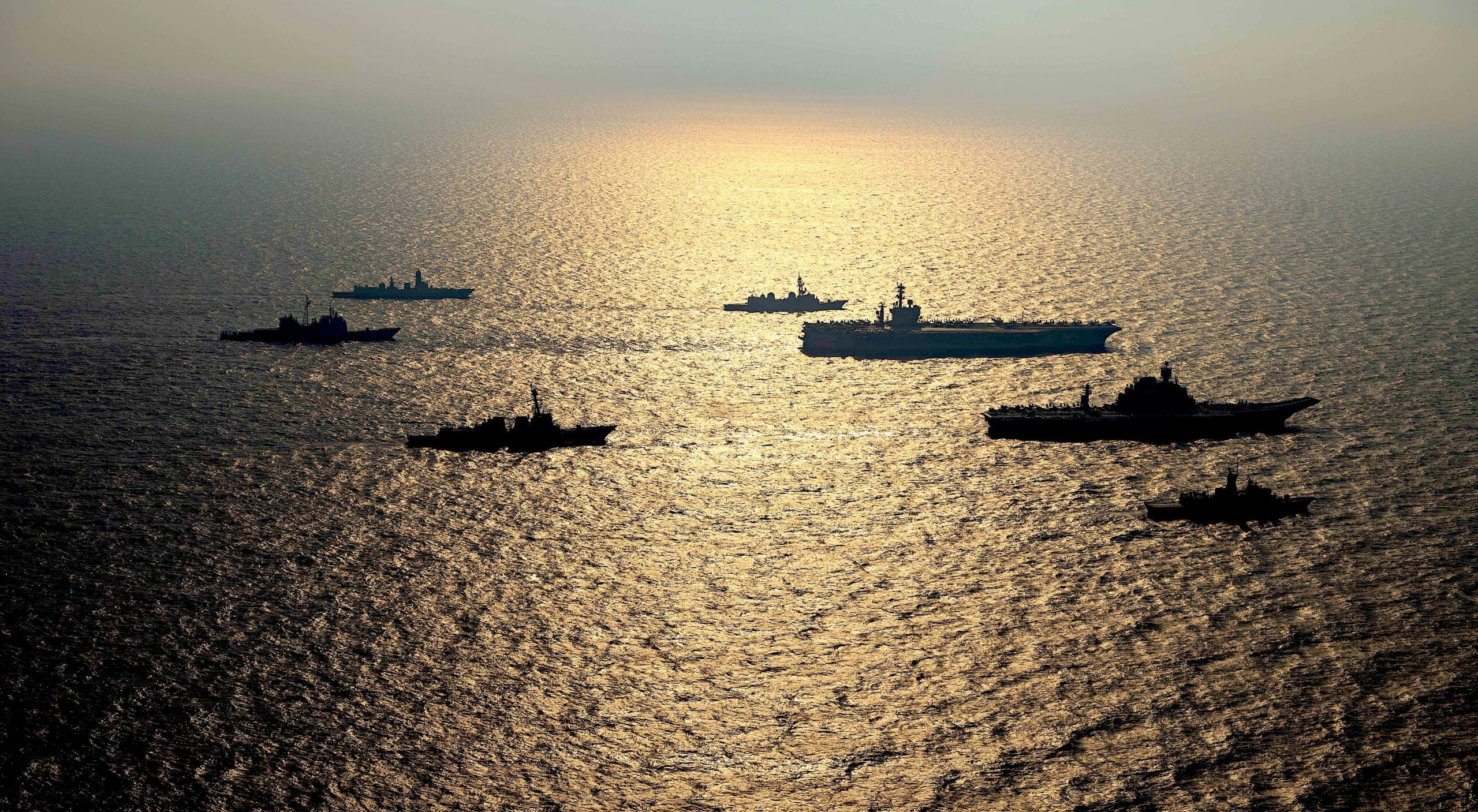
President Joe Biden meeting with Japanese Prime Minister Yoshihide Suga in the Oval Office on April 16. (Wikimedia Commons)
By Joseph Gerson
Common Dreams
 Amidst the national fixation on the outcome of the trial of George Floyd’s murderer and political jockeying over the president’s mega infrastructure proposal, the significance of President Joe Biden’s first new Cold War summit with a foreign leader was lost to most Americans. In politics, symbolism is often substance, and such was the case when the U.S. and Japanese heads of state convened to demonstrate their common military, economic, diplomatic and scientific front against China’s rising power and influence.
Amidst the national fixation on the outcome of the trial of George Floyd’s murderer and political jockeying over the president’s mega infrastructure proposal, the significance of President Joe Biden’s first new Cold War summit with a foreign leader was lost to most Americans. In politics, symbolism is often substance, and such was the case when the U.S. and Japanese heads of state convened to demonstrate their common military, economic, diplomatic and scientific front against China’s rising power and influence.
Not lost on the Japanese public as it faces September elections were the photos and headlines trumpeting the honor given to Prime Minister Yoshihide Suga as the first foreign head of state to be welcomed to Washington, D.C., by Biden.
When the two leaders met with the press to broadcast their “ironclad” commitments to the 70-year-old military alliance, which was forced on Japan in 1952 as a condition for ending the post-war military occupation, Biden stressed the importance of the alliance to continued U.S. supremacy.
“Our commitment to meet in person,” Biden said, “is indicative of the importance, the value we both place on this relationship. We’re going to work together to prove that democracies can still compete and win in the 21st century.”
Biden continued,
“Today Prime Minister Suga and I affirmed our ironclad support for the U.S.-Japanese alliance and for our shared security. We committed to working together to take on the challenges from China and on issues like the East China Sea, the South China Sea, as well as North Korea, to ensure a future of a free and open Indo Pacific.”
The two powers also underscored their agreement of “the importance of peace and stability of the Taiwan Strait between Japan and the United States, which was reaffirmed.” This at a time when the Biden administration is ramping up diplomatic and military support for Taipei, and China has responded with dangerously provocative intrusions of Taiwanese airspace by its warplanes.
Lost in the Rhetoric
Lost in the cliched rhetoric was that China’s economy, and thus its government’s stability, are dependent on international trade and thus to the unimpeded transport of goods and resources across the Indian and South China Seas. Similarly, the reference to “democracies” left something wanting. Japan has been a functional one-party state for almost seven decades. India, a key alliance partner, is increasingly an authoritarian Hindu nationalist state in which millions of Muslims have been disenfranchised. And President Rodrigo Duterte in the Philippines presides over a murderous dictatorship, the leadership of which may soon be transferred to the dictator’s daughter.

U.S. Secretary of Defense Lloyd Austin, left, and U.S. Secretary of State Antony Blinken, right, meeting with Japanese Prime Minister Yoshihide Suga, in Tokyo on March 16. (State Department, Ron Przysucha)
The centrality of the alliance with Japan to maintaining United States power and privilege as the dominant—and in President Barack Obama’s words “Pacific nation”—was signaled before Prime Minister Suga made his way to Washington. In March, as part of the Biden Administration’s diplomatic and military shows of force on the eve of Secretary of State Tony Blinken’s and National Security Advisor Jake Sullivan’s confrontational quasi-summit with the Chinese counterparts in Anchorage, the secretary of state and Secretary of Defense Lloyd Austin, made their first overseas travel to Tokyo to demonstrate alliance solidarity and thus its implicit threat to Beijing.
Japan, which “hosts” more than 100 U.S. military bases and installations from Hokkaido in the north, to Okinawa in the south, has long been seen as the “keystone” of U.S. Asia-Pacific power and the “hub” of the “hub and spokes” Asia-Pacific alliance structure. As former Prime Minister Nakasone once remarked, “Japan is an unsinkable aircraft carrier for the United States.” It served as a Cold War bastion against China and the Soviet Union, as the home of the U.S. 7th fleet, and as the jumping off point for U.S. forces during the Korean and Iraq Wars, and for military operations across the Western Pacific.
Yet, even as Japan’s national security policy is anchored by the United States nuclear umbrella, so-called extended nuclear deterrence, it too has become a regional power. Most people in the United States still think of Japan as a peaceful nation due to its U.S.-imposed, war-renouncing Peace Constitution, which even prohibits maintenance of a military force. But, in what passes for Japanese democracy, constitutional provisions and the law have consistently been bent to serve power politics.
Beginning with pressure from the Truman administration during the Korean War, allied with nationalist and militarist Japanese forces, Tokyo has created a military by another name: the Japanese Self Defense Forces. It includes Asia’s most technologically advanced navy which has joined the U.S. in provocative “integrated operations” in the South China Sea. Its missiles, which can reach Mars, could certainly be targeted against Beijing and Shanghai. And despite the Japanese people’s “nuclear allergy” in the wake of the Hiroshima and Nagasaki atomic bombings, the government maintains 47 tons of plutonium and is often described as being a screwdriver turn away from becoming a nuclear power.

Dec. 6, 2016: Then U.S. Secretary of Defense Ash Carter meets with sailors stationed at Naval Base Yokosuka, Japan. (DoD, Brigitte N. Brantley)
While working hand-in-hand with the United States in developing the Quad (the emerging U.S., Japanese, Australian and Indian alliance structure) to encircle and contain China, that alliance and its diplomatic, economic and military ties with Taiwan and ASEAN nations are designed to persist even in the event of a possible future U.S. withdrawal from the western Pacific.
Competing Interests
Like every other nation, Japan is a country of competing interests which cannot be ignored. Powerful Japanese forces have vested interests in stable relations with China and press to limit actions that could undermine their wealth and influence. In 2019 Japanese firms and institutions had more than $130 billion invested in China. Potentially more important for Japanese economic stability in its era of stagnation is its $317 billion in annual trade with China.
In addition, there is also the reality of Japanese disorientation. China’s rise and increasing military power, after a century of Japanese looking down on the weaker and long impoverished nation—including fifteen years of war and colonization of much of the Middle Kingdom—, have come as a shock to Japanese society. Japan’s priorities lie in maintaining stability, thus it has joined the U.S. to manage and contain China’s rise.
In their meeting with the press, Prime Minister Suga stressed this commitment by saying, “We agreed to oppose any attempts to change the status quo by force or coercion in the East and South China Seas and the intimidation of others in the region.” He also reaffirmed Japan’s commitment to maintain the status quo in Taiwan.
That said, protecting Japanese economic interests, which are intimately tied to Suga’s Liberal Democratic Party, requires sensitive diplomatic balancing that will keep Suga and his mandarins busy in the months ahead. China protested that the U.S.-Japanese summitry went “far beyond the scope of normal development of bilateral relations” and sowed regional division.
Japanese officials must now thread the diplomatic needle in the complex and difficult negotiations for Xi Xining’s planned 2022 visit to Tokyo to mark the 50th anniversary of the restoration of formal relations a decade and a half after Japan’s surrender and panicked withdrawal from the Asian mainland.

Naval vessels from the U.S., Australia, Japan and India in multilateral exercises in the Arabian Sea in 2020. (U.S. Navy, Wikimedia Commons)
Eager to avoid the consequences of offending Beijing, Japan is the only G-7 power not to have condemned or joined in sanctioning China for its repression of Uighurs in Xinjiang. Despite the charge of Chinese “genocide” by both the Trump and Biden administrations for Beijing’s mass imprisonment and repression of Uighers, Biden and Blinken had to compromise in the wording of the joint statement for the sake of maintaining the alliance. “Concern,” not outrage, was the wording used to describe their response to developments in Xinjiang.
In addition to the primacy given to showcasing the alliance and highlighting South and East China Sea and Taiwan military commitments, a number of other commitments were made in the joint statement and in the press conference. Recognizing that scientific and technological supremacy is central to the exercise of power in the 21st century, Biden and Suga committed to jointly invest $4.5 billion to boost their ability to surpass China in 5-G, AI, and quantum computing, and to reconstruct their semiconductor supply chains.
They agreed to coordinate their approach to North Korea, with the hope of including South Korea in that coordination. And, while the fate of this summer’s Tokyo Olympics remains uncertain, and with them Suga’s hopes that successful games will boost his September reelection chances, Biden offered his support for the pandemic-threatened extravaganza.
Next up, President Moon Jae-in of South Korea will be making his alliance pilgrimage to Washington, D.C. in May. Heralding that summit’s success will not come as easily as it did for the theater with Prime Minister Suga.
The Republic of Korea is more economically dependent on trade with China than is Japan. Resolving the nuclear crisis and taking steps toward reunification with North Korea are more important to President Moon than joining with the United States and Japan to contain Beijing. The lure of engagement with China’s economy and its potential role in facilitating negotiations with Pyongyang leave the U.S.-South Korean alliance less than “rock solid.”
The existential truth is that the U.S. and China are caught in the Thucydides Trap, the historic pattern of inevitable tension between rising and declining powers that have too often climaxed in catastrophic wars—two World Wars in the 20th century. Conflict and war with China are not inevitable and must be avoided.
Instead of seeking to contain China militarily, economically, technologically and diplomatically, we should be taking lessons from the establishment of detente with the Soviet Union during the last Cold War. Faced with existential threats to humanity’s survival requires focusing on cooperation with China to reverse climate change, defeat and prevent pandemics, and rid the world of the nuclear sword of Damocles.
Joseph Gerson is president of the Campaign for Peace, Disarmaent and Common Security, co-founder of the Committee for a SANE U.S. China Policy and vice president of the International Peace Bureau. His books include Empire and the Bomb, and With Hiroshima Eyes.
This article is from Common Dreams.
The views expressed are solely those of the author and may or may not reflect those of Consortium News.
Please Support Our
Spring Fund Drive!



“China has responded with dangerously provocative intrusions of Taiwanese airspace by its warplanes.”
This is simply untrue.
A lie.
USA and other puppets refuse to notify China when entering the extended “Chinese Air Defence Notification Zone”
China has entered the area that Taiwan claims for it’s “Air Defence Notification Zone” without notifying Taiwan.
Simple tit-for-tat.
The article fails to note that the Biden White house reception of Japan’s Prime Minister was a huge slap in the face to Japan.
An insult that will not be forgiven or forgotten.
Too many Americans are still slaves of childhood Cold War anti-communist brainwashing. PRC is as capitalist as can be, but many in he US can’t get their minds around that.
Only can say a very informative and perceptive article and let’s hope what Mister Gerson advice is taken seriously.
“Faced with existential threats to humanity’s survival requires focusing on cooperation with China to reverse climate change, defeat and prevent pandemics, and rid the world of the nuclear sword of Damocles.”
Many think the Sword of Damocles was removed at the end of the Cold War: it is still dangling there. Very few notice. It is a widespread illusion that humanity is moving away from the risk of nuclear war: the opposite is true. History shows nations end up getting the war they do not want, and delude themselves into thinking it is not coming.
A very good article, correctly pointing out that Japan is a one-party pseudo “democracy”, and a very submissive vassal of the USA. Remember how George Bush the Elder forced them to revalue the yen and tank their economy for a generation?
Les deux bombes nucléaires avaient pour seule raison de forcer la main de l’empereur: il était déjà en pourparlers avec Moscou pour la reddition du Japon. Le Japon était vaincu.
I’m no fan of imperialism, the US Empire, the new cold war against China, etc but calling Rodrigo Duterte a “dictator” is ridiculous and beyond ignorant. It sounds like what some propagandist on CNN would say. It seriously harms the credibility of the author. Duterte may be a loud month who throws insults and extremely authoritarian when it comes to the drug war in his country but he is far from a “dictator”. He was democratically elected and despite what the West might say, the majority of the people in Philippines love him, especially the large poor class because they know he genuinely cares about them which is why they support his stance on the drug war bc the drugs has seriously destroyed the country. Unlike here in America who’s “drug war” was a bogus cover to attack hippies, black/brown people and anti-war (as openly admitted by a Nixon staffer in a interview back in the 90s, look it up)..Duterte’s drug war is a genuine policy against increasing drug problem in Philippines and has been successful. Now without question it has resulted in the death of civilians which is a valid criticism but doesn’t negate what I said beforehand.
You can honestly tell the author of this articles doesn’t know much about Philippines or Duterte and simply repeating what he heard others say like a parrot.
What’s funny is that that $4.5B is less than what Huawei has invested on their own in 5G/6G technology. They are preparing to launch 6G test satellites soon. The fools don’t realize that, rather than trying to keep up with the leader, they really need to do their own thing. The US needs to realize that you can’t suppress other countries. Trump’s attempts via blacklisting Chinese companies and sanctions are stupid and futile. The US no longer has a corner on the market of sharp scientists and engineers and the swiftness of China’s response to COVID should have warned the US of the p0wer of Chinese society. The Chinese will be able to make what we are denying them and they’ll probably be able to do that a lot quicker than we would imagine and then we’ll be permanently locked out of their market. Plus those businesses that want a stable environment that isn’t subject to the whims of an increasingly unstable political government won’t come looking either.
Le Japon est vassal des USA.
Il ne faut jamais oublier que le Japon s’est fait complice des USA en ne voulant pas sciemment les dénoncer pour la destruction nucléaire de Hiroshima et de Nagazaki SANS AUCUNE RAISON MILITAIRE VALABLE.
La BÊTE washingtonienne a tué femmes, enfants et vieillards pour leur unique plaisir psychopathe de détruire et de tuer. ET CELA, PLUTÔT DEUX FOIS QU’UNE. Le Japon est resté pareil à lui-même.